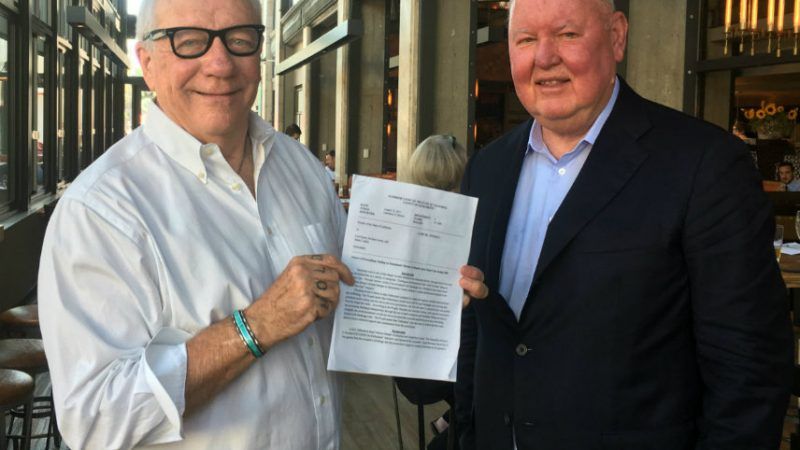Backpage Founders Trial Finally Begins
from the where-will-it-end? Dept
It's been over three years since Backpage.com was seized (the week before FOSTA was signed into law -- which is notable since every conversation about the need for FOSTA claimed it was because existing laws were useless to stop Backpage). However, in the intervening years we've seen that the loss of Backpage, rather than "protecting" women, seems to have put women at much greater risk. The recent Government Accountability Office (GAO) report highlighted how the loss of Backpage, combined with FOSTA, has made it difficult for law enforcement to track down actual sex traffickers.
As more of the backstory behind the war on Backpage came out, the more ridiculous it looked. The company actually was incredibly helpful in working with law enforcement to track down and stop sex trafficking. The problem came when law enforcement wanted to stop more than actual sex trafficking, and started going after consensual sex work. Backpage pushed back, suggesting that was too far, and that's when the government turned Backpage into being a villain
With the trial beginning, the Daily Beast has as pretty comprehensive and pretty fair article detailing the whole thing, including raising serious questions about what exactly Backpage's founders actually did to deserve this criminal trial.
According to documents published by Reason, federal prosecutors in the Western District of Washington reviewed more than 100,000 documents and interviewed more than a dozen witnesses in 2012 in an attempt to bring a case against Backpage, but failed to find a smoking gun. In fact, according to a memo written by two assistant U.S. attorneys at the time, local FBI agents found the company “remarkably responsive to law enforcement requests” and said the site “often takes proactive steps to assist in investigations.”
“At the outset of this investigation, it was anticipated that we would find evidence of candid discussions among [Backpage] principals about the use of the site for juvenile prostitution which could be used as admissions of criminal conduct," the attorneys wrote in a 2013 update to the memo. "It was also anticipated that we would find numerous instances where Backpage learned that a site user was a juvenile prostitute and Backpage callously continued to post advertisements for her. To date, the investigation has revealed neither.”
The article also notes how damaging FOSTA and (relatedly) the loss of Backpage has been:
In the weeks after its passage, FOSTA/SESTA felled not only Backpage, but other adult advertising sites like Massage Republic and Cityvibe, and even the Craigslist personal ads section. The impact was tangible: A survey from the sex worker advocacy group Hacking/Hustling found 33.8 percent of respondents reported an increase in violence from clients after the law was signed, and 72.5 percent reported they were facing increased financial insecurity. Advocates related stories of sex workers who were thrust into the arms of pimps in order to find work, or back into abusive relationships for want of somewhere to stay.
The article does note that the founders on trial, Jim Larkin and Michael Lacey, could be highlighting the harm to sex workers that came from taking down Backpage, but instead they've focused specifically on the "free speech" arguments.
Whether Larkin and Lacey want this status is less clear. Their pre-trial statement paints them as free-speech warriors valiantly defending “offensive” and unpopular speech.” Conspicuously missing from the statement, as journalist Melissa Gira Grant pointed out on Twitter, are the words “prostitution” or “sex work;” there is only a glancing reference to “adult advertising.”
Kaytlin Bailey, a former sex worker and host of The Oldest Profession Podcast, says the longtime newspapermen are now telling the wrong story.
“I were in their shoes, the story I would be telling is the story of the survival of their users,” she said, referring to the sex workers who lost their source of income when the site was taken offline.
“They think of themselves as free speech warriors, and I think sex workers think of themselves as in a fight for survival.”
The article also quotes Prof. Alexandra Yelderman, who has been one of the top scholars on the dangers of things like FOSTA and removing sites that facilitated speech, highlighting just how questionable this lawsuit actually is:
Alexandra Yelderman, a visiting assistant professor at the University of Notre Dame Law School, argues that the trial still holds serious significance—more so than the criminal prosecutions of RentBoy, myRedBook, and other adult websites. While those sites only advertised sex work, Yelderman said, Backpage advertised other services, such as housing, cars, and temporary jobs. And everyone should be concerned that the government would jeopardize that kind of speech to get at the other stuff.
“What the Backpage takedown and prosecution is an example of is the government's willingness to throw all sorts of speech under the bus here, in order to get at speech that—according to the indictment—facilities the crime of prostitution,” she said.
“This is not a trafficking prosecution,” she added. “This is a case where allegations that [the founders] facilitated prostitution were an impetus for the government to take aim at this entire swath of speech.”
Whether you liked Backpage or not -- and it's fair to criticize some of the company's business practices -- this trial is incredibly important. And given the nature of the subject matter (not to mention some serious concerns about the judge's conflicts--she's married to the state Attorney General who campaigned against the website), there's a decent chance of a ruling here that will set a terrible precedent both for free speech online and for sex workers.
Filed Under: 1st amendment, fosta, free speech, james larkin, michael lacey, section 230, sex trafficking, sex work, user generated content
Companies: backpage




No comments:
Post a Comment